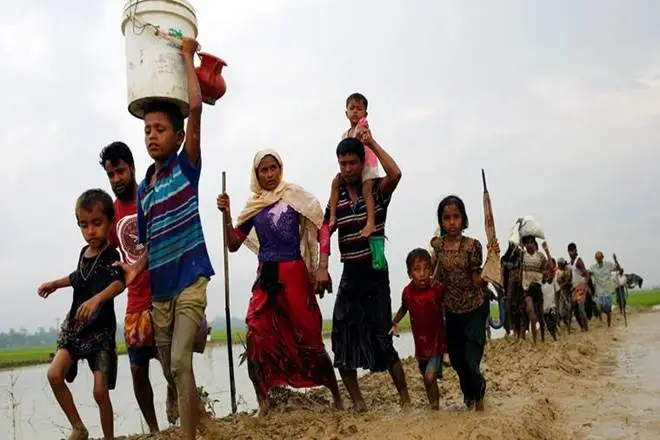Introduction to the Flooding Crisis in Nigeria
Nigeria is currently grappling with one of its most severe flooding crises in recent history. The relentless rains have transformed vast areas into waterlogged landscapes, displacing families and threatening livelihoods. As rivers swell beyond their banks, communities are left struggling to cope with the aftermath. This situation has escalated from a natural disaster to a profound humanitarian crisis, impacting not just homes but also food security across the nation. With many regions submerged, the urgent need for action has never been clearer as Nigeria faces an uphill battle against this devastating flood disaster.
Causes of the Flooding
Nigeria’s flooding crisis stems from a mix of natural and human factors. Heavy rainfall during the wet season is a significant contributor. The country experiences intense downpours that overwhelm drainage systems, leading to widespread inundation.
Deforestation exacerbates the situation. As trees vanish, so do their roots that traditionally absorb rainwater. This loss creates more runoff, increasing flood risk in urban areas.
Urbanization plays its part too. Rapid city growth often leads to poor planning and inadequate infrastructure. Streets become rivers as water struggles for pathways through concrete jungles.
Climate change cannot be overlooked either. Rising temperatures lead to unpredictable weather patterns, intensifying the frequency and severity of storms across Nigeria.
Poor waste management blocks drainage channels further complicating flood control efforts. These combined issues have created a perfect storm for devastating floods in communities nationwide.
Impact on Communities and Citizens
The flooding crisis in Nigeria has left a devastating mark on communities. Homes have been submerged, forcing families to seek shelter in overcrowded camps. The loss of personal belongings adds emotional strain to an already dire situation.
Agricultural lands are also affected, leading to widespread food insecurity. Crops that once flourished now lie underwater or decimated by the relentless deluge. Farmers face uncertainty about their livelihoods and future harvests.
Access to clean water is critically compromised, heightening health risks among vulnerable populations. Diseases like cholera threaten those living in makeshift accommodations where sanitation is poor.
Children’s education suffers significantly as schools become temporary shelters or remain closed due to damage. The disruption impacts not just current learning but also long-term prospects for these young minds.
Community ties are strained as neighbors grapple with shared grief and dwindling resources. Unity and resilience emerge amid adversity, yet the challenges ahead loom large for many citizens facing this flood disaster.
Government Response to the Crisis
The Nigerian government has faced intense scrutiny over its response to the ongoing flood disaster. With millions affected, officials have declared a state of emergency in several regions.
Relief efforts have been initiated, focusing on providing immediate assistance like food and shelter. However, many communities report delays and inadequate supplies. This shortfall raises concerns about governmental preparedness for natural disasters.
Local authorities are mobilizing resources but often lack coordination with national agencies. The discrepancy leads to confusion on the ground, hampering relief distribution.
In addition to immediate aid, there is talk of policy revisions aimed at improving infrastructure resilience against climate change impacts. Yet, critics argue that these measures may take too long when people need help now.
Public sentiment remains mixed as citizens call for more transparency and accountability from their leaders during this crisis.
International Aid and Support
International aid has become a lifeline for Nigeria as it grapples with the severe flooding crisis. Various nations and organizations are stepping in to provide essential support.
Relief efforts include food, medical supplies, and shelter for displaced families. Non-governmental organizations (NGOs) play a crucial role by distributing resources directly to affected areas. These groups often have local knowledge that helps them identify urgent needs swiftly.
Countries like the United States and those within the European Union are pledging funds to assist recovery efforts. This financial backing enables quicker responses to immediate challenges faced by communities.
Additionally, international partnerships help facilitate long-term strategies aimed at disaster preparedness. They focus on building resilient infrastructure that can withstand future flood disasters while addressing underlying issues contributing to food insecurity across regions.
With such collaborative efforts, there’s hope for restoring stability in affected areas amidst this ongoing crisis.
Long-Term Solutions for Preventing Future Floods
To address the ongoing flood disaster in Nigeria, long-term solutions are paramount. Investing in robust infrastructure is vital. This includes constructing proper drainage systems and reinforcing riverbanks to withstand heavy rains.
Reforestation efforts can also play a crucial role. Planting trees helps absorb excess rainwater while reducing soil erosion. Creating wetlands may serve as natural buffers against flooding, allowing ecosystems to thrive and manage water more effectively.
Community education on sustainable agricultural practices can mitigate food insecurity exacerbated by floods. Farmers should be trained in crop rotation and soil management techniques that improve resilience.
Additionally, implementing effective land-use planning ensures that urban development does not encroach upon flood-prone areas. Regular assessments of climate change impacts will help adapt strategies accordingly, making communities better equipped for future challenges related to flooding.
The Urgent Need for Action
The flooding crisis in Nigeria demands immediate and decisive action. Millions have been affected, suffering the dire consequences of a flood disaster that has devastated homes, businesses, and livelihoods. Communities are grappling with food insecurity as their farmlands remain submerged under water. The ripple effects extend beyond physical devastation; they impact mental health, education, and local economies.
Government initiatives must ramp up to provide urgent relief and rehabilitation efforts for those displaced by the floods. However, it is essential not only to respond but also to build resilient infrastructure that can withstand future natural disasters. Collaboration between local authorities and international organizations could foster innovative solutions tailored to Nigeria’s unique challenges.
The time for comprehensive strategies is now—strategies that prioritize sustainable practices aimed at preventing similar crises going forward. It requires a unified effort from all stakeholders: government entities, NGOs, communities, and individuals alike. Only through collective action can Nigeria hope to emerge stronger from this ongoing crisis while safeguarding its people against future flood disasters.
Every moment counts when lives hang in the balance—the urgency cannot be overstated.




